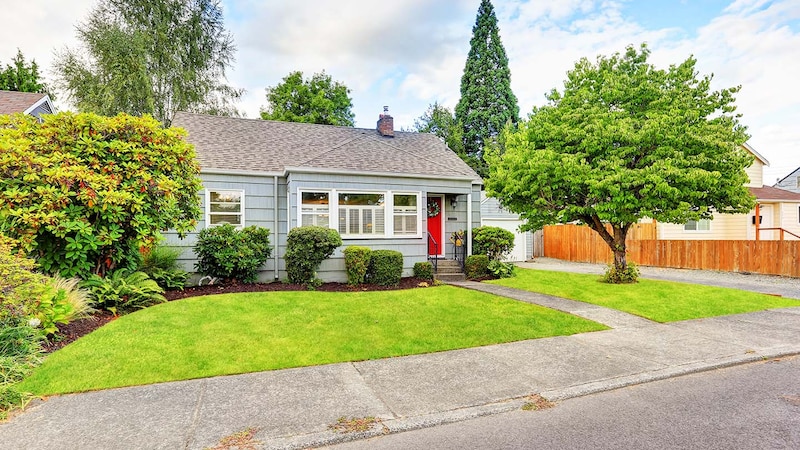A guide to mortgage rates: Definition, types and how they’re calculated

Quick insights
- Mortgage interest is the cost of borrowing money from the lender.
- The interest rate directly affects your monthly payments, so a higher interest rate means higher monthly payments and more money paid over the loan term.
- Fixed-rate mortgages have a constant interest rate for the entire loan term, while adjustable-rate mortgages (ARMs) can change over time based on market conditions.
Think of a mortgage interest rate like a fee that a bank charges you for using their money. Instead of paying your mortgage provider a lump sum, the interest is paid as part of your monthly payment for your home loan. The higher the rate, the more you’ll end up paying over time. For instance, if you take out a mortgage to buy your first house, the interest rate will affect your monthly payment and how much you’ll owe at the end of your loan.
A lower interest rate means you can put more money toward your home instead of paying interest, which could potentially save you money over the years. Overall, your mortgage interest rate can make a difference in how affordable your home is.
How do mortgage interest rates work?
The mortgage interest rate is the percentage that a loan provider charges for borrowing money to buy a home. The number influences your monthly payment amount and the total cost of the loan.
Here are some important points:
- How it’s applied: The interest rate is applied to the principal balance of your mortgage. For example, if you borrow $200,000 at a 4% interest rate, you’ll pay 4% annually on the remaining balance of the loan.
- Fixed vs. adjustable rates: With a fixed-rate mortgage, the interest rate remains the same throughout the life of the loan, providing predictable monthly payments. With an adjustable-rate mortgage (ARM), the interest rate can change over time, usually after an initial fixed period, based on market conditions.
- Interest calculation: Interest is typically calculated monthly based on the loan’s remaining balance, meaning early in the loan term, a larger portion of your payment goes toward interest. Over time, as the principal balance decreases, the interest portions of your monthly payments also decrease.
- Total loan cost: The interest rate helps determine your monthly payment and affects the total amount you will pay over the life of the loan. A lower rate means less interest is paid.
- Factors influencing the rate: Your mortgage rate is influenced by factors like your credit score, down payment, loan type and overall market conditions. A higher credit score and larger down payment could help you secure a lower interest rate.
Mortgage interest rate vs. APR
Your interest rate is one component of the figure that makes up your annual percentage rate (APR). For this reason, your APR is typically higher than your mortgage rate. Here’s the difference:
- Mortgage interest rate: The percentage charged on the loan amount itself. The rate directly affects your monthly mortgage payment.
- APR: Provides a more complete picture of the total cost of the mortgage in one year. The APR includes the interest rate and additional costs and fees associated with the loan, such as closing costs, discount points and insurance.
The mortgage interest rate focuses only on the interest you will pay, while the APR gives you a broader view of all the costs over the life of the loan.
Mortgage interest types
The term, length of time it takes to pay off your loan and type of mortgage you have affect your monthly interest rate. There are two main types of mortgage loans.
Fixed-rate mortgage
A fixed-rate mortgage provides you with a consistent interest rate for the life of your loan. This means your monthly principal and interest (P&I) payment will be consistent, as well. A fixed-rate mortgage generally has a higher interest rate than the initial interest rate on an ARM.
Adjustable-rate mortgage (ARM)
An adjustable-rate mortgage has a fixed introductory rate that stays the same for a set period of time, then may change periodically. This means your monthly P&I payment could increase considerably after your introductory period is over. Rate caps exist to limit the amount your interest rate can rise.
What affects mortgage rates?
Your lender decides your mortgage rate, but it is a unique number also affected by your personal financial situation and larger economic conditions. Customers can also pay to lower a mortgage interest rate.
Personal financial factors
Your personal financial situation is an important factor that determines what mortgage rates you’re eligible for. These factors can help you get an affordable mortgage rate:
- Debt-to-income ratio: Your debt-to-income ratio tells lenders how much of your income is already accounted for. If you have a high debt ratio, your mortgage rate will likely be higher to offset the risk the lender takes by offering you a loan.
- Credit history: Your financial decisions in the past serve as a predictor for lenders of what you might do in the future. A good credit score makes you an attractive borrower to lenders, and you’ll likely be eligible for a lower interest rate.
- Loan size, type and term: The length of time it takes to pay off your loan, and whether you have a fixed or adjustable rate can make a big difference in your mortgage rate amount.
- Down payment amount: A bigger down payment means you owe less on your home, which means you are borrowing less money from the lender and will have more equity in your home.
External economic factors
You can't control these factors, but they help dictate the national average for current mortgage rates:
- Strength of the economy: Economic growth may lead to more homebuyers in the market. As demand increases, so do mortgage rates due to the fact that lenders only have so much money to lend out.
- Employment rates: As unemployment rates increase, mortgage rates usually drop. When the job market is strong, mortgage rates increase to match demand.
- Housing market conditions: When fewer homes are being built, mortgage rates drop as demand for mortgages decreases. An increase in people renting can similarly drive down demand for mortgages and lower rates.
- Stock and bond markets: Mortgage rates typically decrease when the stock market falters.
- Federal Reserve: The Federal Reserve is the nation’s central bank that works to encourage job growth and keep inflation under control. While the Federal Reserve doesn’t actually set mortgage rates, the numbers generally rise and fall with the change in federal funds rate.
- Inflation rates: Inflation means lenders are less likely to get a complete return on their investment. Mortgage rates typically rise with inflation.
How to lower, change or lock-in your mortgage rate
While you can’t control external factors that determine your rate, there are ways you can find an affordable mortgage rate.
How to get a lower mortgage rate
Your mortgage rate is an important part of your home loan. Getting a lower mortgage rate can start before you even decide you want to be a homeowner. Building a good credit history and making responsible financial decisions will show lenders you’re a responsible borrower. When you begin searching for a mortgage loan, shop around to see which lenders are offering the best terms.
As you work with a lender to determine the details of your loan, these options may affect the mortgage rate you’re offered:
- The down payment: A bigger down payment means you’re financing less of the total cost of your home and can help you avoid paying private mortgage insurance.
- Mortgage discount points: This is a way you can prepay interest on your mortgage loan. By paying a percentage of the cost of your loan with mortgage points, your interest rate could be reduced.
- Talk to a Home Lending Advisor. Talk about your financial situation and the ways your loan type and term can help you get a lower mortgage rate.
How to change your existing mortgage rate
If you’re having difficulty meeting your monthly payments or simply want to take advantage of current lower mortgage rates, you may be able to change your mortgage rate. It’s important to note that these options may also change other terms of your mortgage.
- Refinancing: Refinancing your loan is the most common way to change your mortgage rate. Refinancing means you’re replacing your loan with a new one. It can help you lower your monthly payments and possibly reduce your total payment amount.
- Loan modification: Mortgage modification programs provide opportunities for homeowners to change the terms of a mortgage.
How to lock in your mortgage rate
Fluctuating market prices mean mortgage rates can change frequently. When you’ve been quoted a mortgage rate you like, it’s important to lock it in. This means you’ll still get the rate you were quoted, even if market rates rise before closing.
Rate locks last anywhere from 30 to 90 days and usually require you to pay a fee. While rate locks prevent your mortgage rate from rising, they may also prevent you from taking advantage of rate drops. Talk to your Home Lending Advisor about lock options.
In summary
Your mortgage rate is one of many factors that affect your monthly payment and the total amount you pay for your home. Taking the time to learn about mortgage rates and how they fluctuate could help you get a lower rate. Talk with a Home Lending Advisor about getting a rate that meets your needs.



